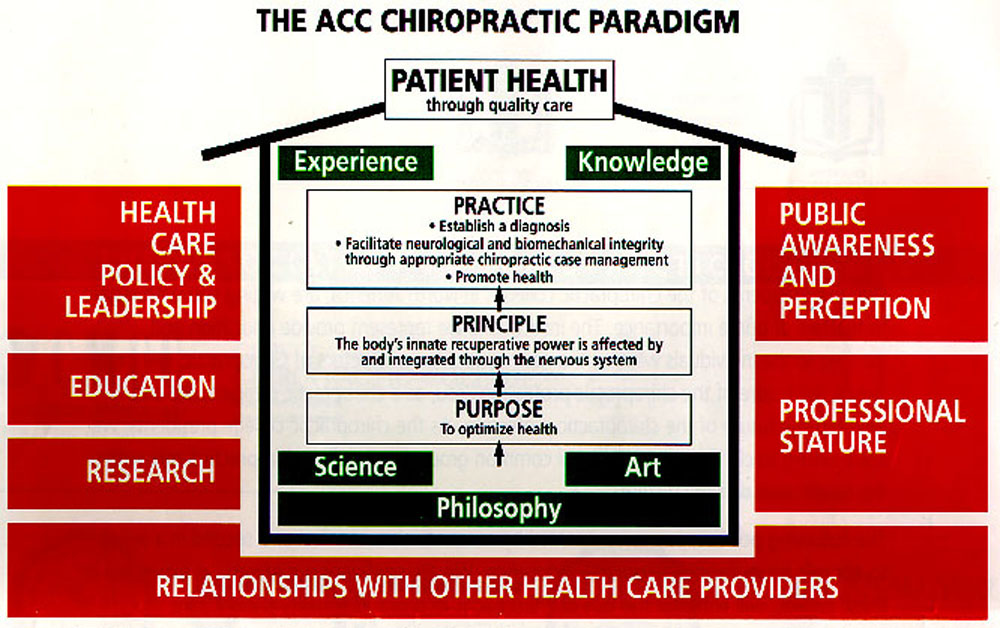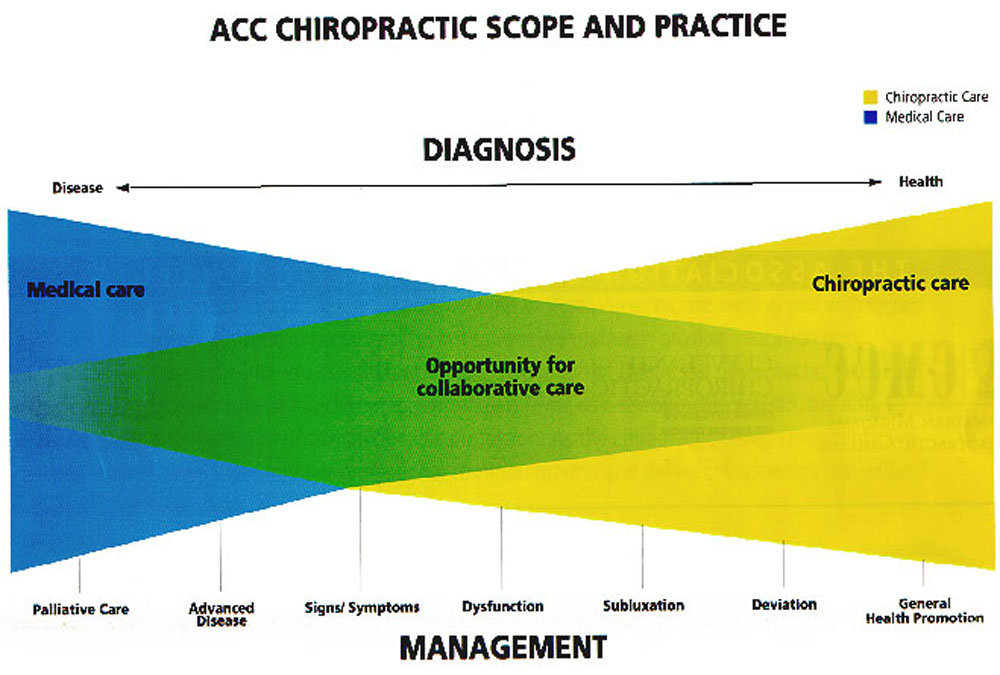

The Association of Chiropractic Colleges (ACC) is
committed to affirming the profession by addressing issues facing chiropractic
education. The ACC brings together a wide range of perspectives on chiropractic
and is uniquely positioned to help define the chiropractic role within health
care.
The ACC is committed to greater public service through reaching consensus
on the following issues which are important to the chiropractic profession:
- continued enhancement of educational curricula;
- strengthening chiropractic research-,
- participating and providing leadership in the development of health
care policy-,
- fostering relationships with other health care providers,
- affirming professional confidence and conduct, and
- increasing public awareness regarding the benefits of chiropractic
care.
The member Colleges of the ACC represent a broad
diversity of institutional missions. The presidents have drafted a consensus
statement that includes the following:
- the ACC position on chiropractic-,
- a representation of the chiropractic paradigm-, and
- clarification regarding the definition and clinical management of the
subluxation.
Additional statements will be forthcoming as the
ACC continues to provide meaning and substance regarding what is taught
in chiropractic colleges and how this information influences the present
and future of the profession.

Chiropractic is a health care discipline which emphasizes
the inherent recuperative power of the body to heal itself without the use
of drugs or surgery.
The practice of chiropractic focuses on the relationship
between structure (primarily the spine) and function (as coordinated by
the nervous system) and how that relationship affects the preservation and
restoration of health. In addition, Doctors of Chiropractic recognize the
value and responsibility of working in cooperation with other health care
practitioners when in the best interest of the patient.
The Association of Chiropractic Colleges continues
to foster a unique, distinct chiropractic profession that serves as a health
care discipline for all. The ACC advocates a profession that generates,
develops, and utilizes the highest level of evidence possible in the provision
of effective, prudent, and cost-conscious patient evaluation and care.

PURPOSE
The purpose of chiropractic is to optimize health.
PRINCIPLE
The body's innate recuperative power is affected
by and integrated through the nervous system.
PRACTICE
The practice of chiropractic includes:
- establishing a diagnosis-,
- facilitating neurological and biomechanical integrity through appropriate
chiropractic case management; and
- promoting health.
FOUNDATION
The foundation of chiropractic includes philosophy,
science, art, knowledge, and clinical experience.
IMPACTS
The chiropractic paradigm directly influences the
following:
- education;
- research;
- health care policy and leadership;
- relationships with other health care providers;
- professional stature;
- public awareness and perceptions; and
- patient health through quality care.

Chiropractic is Concerned with the preservation
and restoration of health, and focuses particular attention on the subluxation.
A subluxation is a complex of functional and/or
structural and/or pathological articular changes that compromise neural
integrity and may influence organ system function and general health.
A subluxation is evaluated, diagnosed, and managed
through the use of chiropractic procedures based on the best available rational
and empirical evidence.
Chiropractic Scope and Practice


The Association of Chiropractic Colleges (ACC) brings
together a wide range of perspectives on chiropractic and is uniquely positioned
to help define the chiropractic role within health care. in Position Paper #1
(July 1996), the ACC presidents described the practice of chiropractic within
the chiropractic paradigm to include:
- establishing a diagnosis;
- facilitating neurological and biomechanical integrity through appropriate
chiropractic case management; and
- promoting health.
As part of its on-going commitment to affirming the profession
by addressing issues facing chiropractic education, the ACC presidents have
drafted a consensus statement on chiropractic scope and practice.
ACC member colleges educate students for the competent
practice of chiropractic. These academic institutions have a direct interest
in the definition of the chiropractic scope and practice. Clarity on chiropractic
scope and practice will:
- enhance the consistency and excellence of educational outcomes,
- contribute to a better understanding of chiropractic education and practice,
both within the profession and by the public; and
- provide direction to the profession for the advancement of chiropractic.
This second position paper includes:
- definition of the chiropractic scope; and
- a description of the practice of chiropractic with respect to diagnosis,
case management, and health promotion.

Since human function is neurologically integrated, Doctors
of Chiropractic evaluate and facilitate biomechanical and neuro-biological function
and integrity through the use of appropriate conservative, diagnostic and chiropractic
care procedures.
Therefore, direct access chiropractic care is integral
to everyone's health care regimen.

A. DIAGNOSTIC
Doctors of Chiropractic, as primary contact health care
providers, employ the education, knowledge, diagnostic skill, and clinical judgment
necessary to determine appropriate chiropractic care and management.
Doctors of Chiropractic have access to diagnostic procedures
and /or referral resources as required.
B. CASE MANAGEMENT
Doctors of Chiropractic establish a doctor/patient relationship
and utilize adjustive and other clinical procedures unique to the chiropractic
discipline. Doctors of Chiropractic may also use other conservative patient
care procedures, and, when appropriate, collaborate with and/or refer to other
health care providers.
C. HEALTH PROMOTION
Doctors of Chiropractic advise and educate patients and
communities in structural and spinal hygiene and healthful living practices.
Association of Chiropractic Colleges - David S. O'Bryon,
CAE Executive Director
4424 Montgomery Avenue, Suite 102, Bethesda, Maryland 20814.
e-mail to: Info@ChiroColleges.org
© 2003, The Association of Chiropractic Colleges















